Fuel Tank Replacement P42
Removal Procedure
Tools Required
J 36608 Fuel Sender Tool
- Drain the fuel tank. Refer to Fuel Tank Draining .
- Raise the vehicle on a suitable hoist.
- Disconnect the vent hose at the fuel tank.
- Disconnect the filler tube at the fuel tank.
- Support the fuel tank (4).
- With the aid of an assistant, remove the fuel tank strap attaching bolts (6), nuts (1) and the fuel tank straps (5) and shield.
- Lower the fuel tank enough to disconnect the fuel sender electrical connector and the retaining clips.
- Disconnect the hoses from the fuel sender assembly.
- Remove the fuel tank from the vehicle and place the tank in a suitable work area.
- Remove the fuel sender assembly from the fuel tank using the fuel sender toolJ 36608 . Refer to Fuel Sender Assembly Replacement .
Important: Clean all the fuel pipe and hose connections as well as the surrounding areas before disconnecting the fuel pipes and hoses.
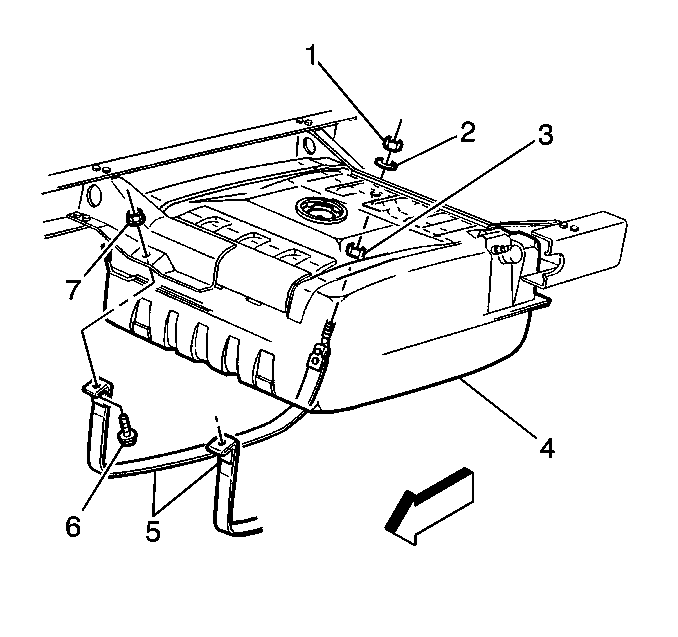
Installation Procedure
- Install the fuel sender assembly with new O-rings on the fuel pipes. Refer to Fuel Sender Assembly Replacement .
- Position and support the fuel tank (4).
- Position the fuel tank straps (5) and connect the fuel feed and return hoses to the fuel sender fittings.
- Connect the electrical connector to the fuel sender assembly.
- Install the retaining clips.
- Install the fuel filler vent hose to the vent pipe.
- Install the fuel filler neck connecting tube to the fuel tank.
- Install the fuel tank strap bolts (6) and nuts(1).
- Bleed any air from the fuel system. Refer to Fuel Feed Pipe and Return Pipe Purging .
- Start the engine and check for leaks.

Notice: Use the correct fastener in the correct location. Replacement fasteners must be the correct part number for that application. Fasteners requiring replacement or fasteners requiring the use of thread locking compound or sealant are identified in the service procedure. Do not use paints, lubricants, or corrosion inhibitors on fasteners or fastener joint surfaces unless specified. These coatings affect fastener torque and joint clamping force and may damage the fastener. Use the correct tightening sequence and specifications when installing fasteners in order to avoid damage to parts and systems.
Tighten
Tighten the fuel tank strap bolts and nuts to 13 N·m (115 lb in).
Fuel Tank Replacement P32
Removal Procedure
- Drain the fuel from the tank. Refer to Fuel Tank Draining .
- Raise the vehicle.
- Remove the fuel tank rear shield, if equipped.
- Remove the fuel tank side shield, if equipped.
- Support the fuel tank and remove the tank straps and insulator strips, if equipped.
- Lower the fuel tank.
- Disconnect the fuel feed and vapor hoses.
- Disconnect the electrical connections at the sender.
- Remove the fuel sender assembly and seal ring, using tool J 39765 . Discard the old seal ring. Purge the tank, if the tank is being repaired.
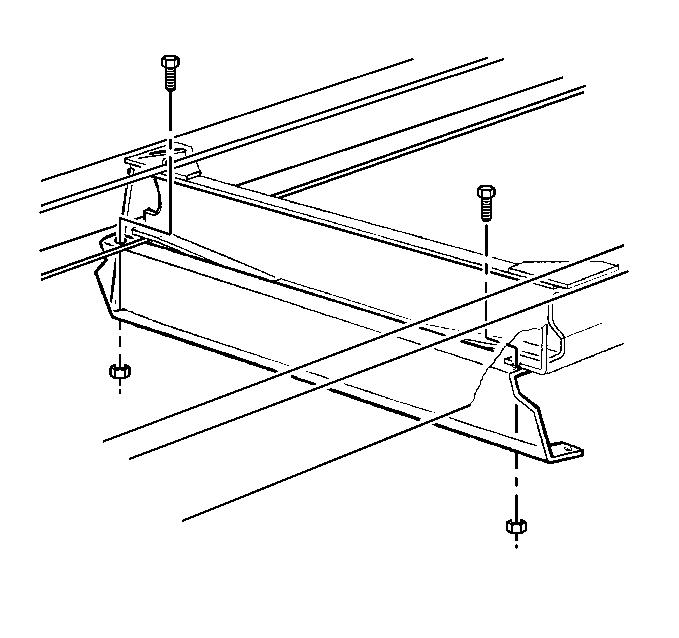
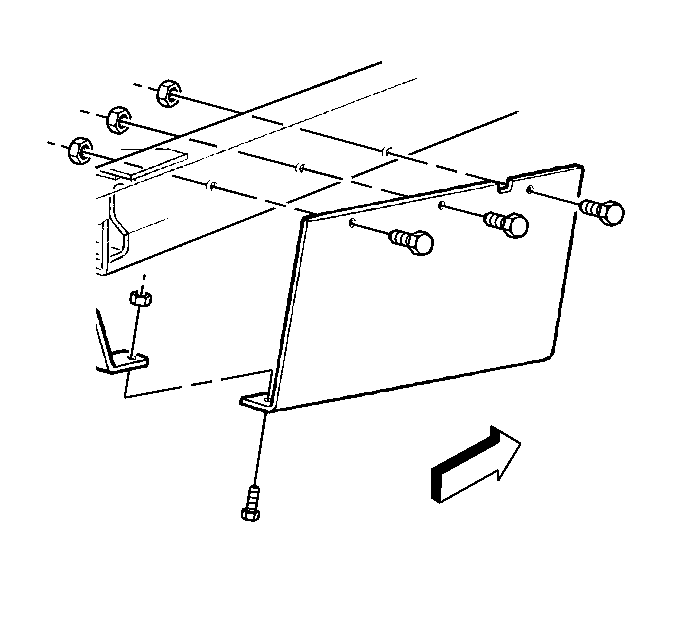
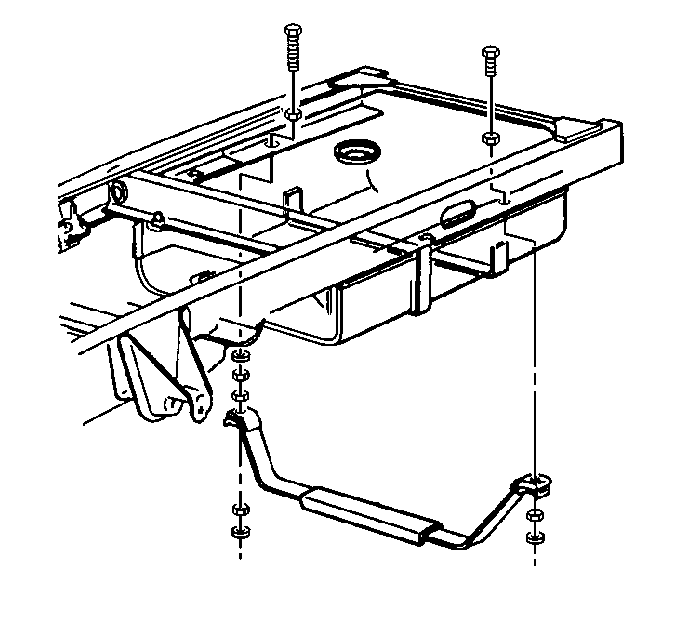

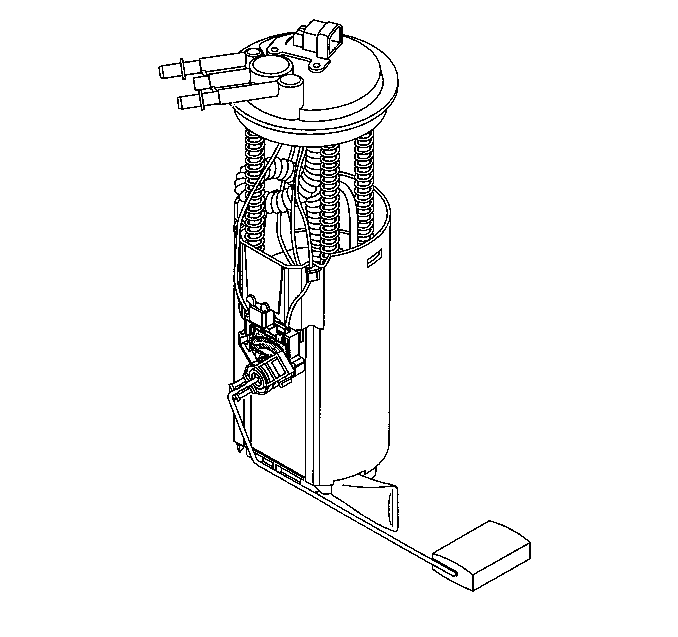
Installation Procedure
- Install the new seal ring and reinstall the sender using tool J 39765 .
- Raise the tank slightly and reconnect the fuel feed and vapor hoses and the electrical connections at the sender.
- Raise the tank fully.
- Support the fuel tank and install the tank straps and the insulator strips.
- Install the fuel tank brackets with insulator strips in place.
- Install the rear fuel tank shield.
- Install the fuel tank side shield.
- Replenish the fuel in the tank. Reinstall the fuel tank filler cap.
- Reconnect the negative battery cable. If a memory retention device was not used, please reset (to the extent possible) all devices that lost their memory after the battery was disconnected.
- Check for fuel leaks.



Notice: Tighten the strap fasteners by steps, alternating between the fasteners, until the specified torque is reached. A failure to tighten the strap fasteners as specified will cause the bottom of the tank to flex upward. This will result in the fuel gauge indicating that there is fuel remaining in the tank when the tank is empty.
Tighten
Tighten the strap nuts to 45 N·m (33 lb ft).
Notice: Use the correct fastener in the correct location. Replacement fasteners must be the correct part number for that application. Fasteners requiring replacement or fasteners requiring the use of thread locking compound or sealant are identified in the service procedure. Do not use paints, lubricants, or corrosion inhibitors on fasteners or fastener joint surfaces unless specified. These coatings affect fastener torque and joint clamping force and may damage the fastener. Use the correct tightening sequence and specifications when installing fasteners in order to avoid damage to parts and systems.


| 10.1. | Turn ON the ignition switch for 2 seconds. |
| 10.2. | Turn OFF the ignition switch for 10 seconds. |
| 10.3. | Again, turn the ignition switch to the ON position. |
| 10.4. | Check for fuel leaks. |
